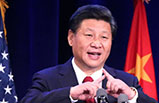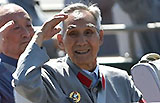Russia's military build-up in Syria reinvigorates political solution
(Xinhua) Updated: 2015-09-27 07:52Explaining the shift in the US stance, Osama Danura, a Syrian political analyst, said that "the US wild cards in the region are diminishing... the US cannot send troops on ground for many reasons but on the contrary the Russians are increasing their military build-up."
Osama said that the US regional allies are also not in their best shape. Saudi Arabia is drowned in its war on Yemen and Turkey is also struggling with its internal issues, like the elections and the Kurds. "the time now is the best for Russia to step in and solve the situation by its own rules," he said.
Sharif Shehadeh, a Syrian legislator, said that "the United States have finally realized that what is happening in Syria is not a revolution but groups of terrorist groups coming to the region to plan foreign schemes."
"The United States realized the threat of terrorism, and that's why it handed over solving the Syrian crisis to the Russians, especially after the failure of the US-led anti-terror coalition, whose 6,000 airstrikes on the IS positions in Syria, have so far done nothing to stem the momentum of this terror group," he said.
The Lebanese Assafir newspaper said the increased Russian presence in Syria provides the suitable ground for Moscow to negotiate the Syrian crisis with Washington and enables Russia to preserve a long-lasting foothold on the Mediterranean, where it already has a naval base in the Syrian coastal city of Tartus.
It added that the Syrian regime will be more comfortable when entering the political negotiations after the Russian involvement, because that will grant the Syrian regime firm control over its favorite areas. These areas constitutes of areas that are still under the firm control of the government, stretching from the coast to Damascus through Homs and Hama.
In the short run, the Russian step has eliminated the possibility of toppling the Assad regime, the paper added.
Bashar Jaafari, Syria's permanent representative to the UN, told the pan-Arab al-Mayadeen TV that Russia will further increase the engagement and military support to Syria "because Russia has also sensed that the Western failure in fighting the IS will have negative repercussion on Russia as the terror group will threat Russia as well."
Also, Hassan Nasrallah, the head of the Lebanese Hezbollah group which is fighting alongside the Syrian army on several fronts, said in an interview that "the military situation in Syria will improve in favor of the Syrian regime, not the other party (rebels). This will reinforce and enhance the chances of the political solution."
"The internal Syrian readiness for dialogue and reaching a political solution is very high. The ones who were hindering that were the foreign countries...but when their stances are starting to change, the chances of the political solution are increasing," Nasrallah said.



